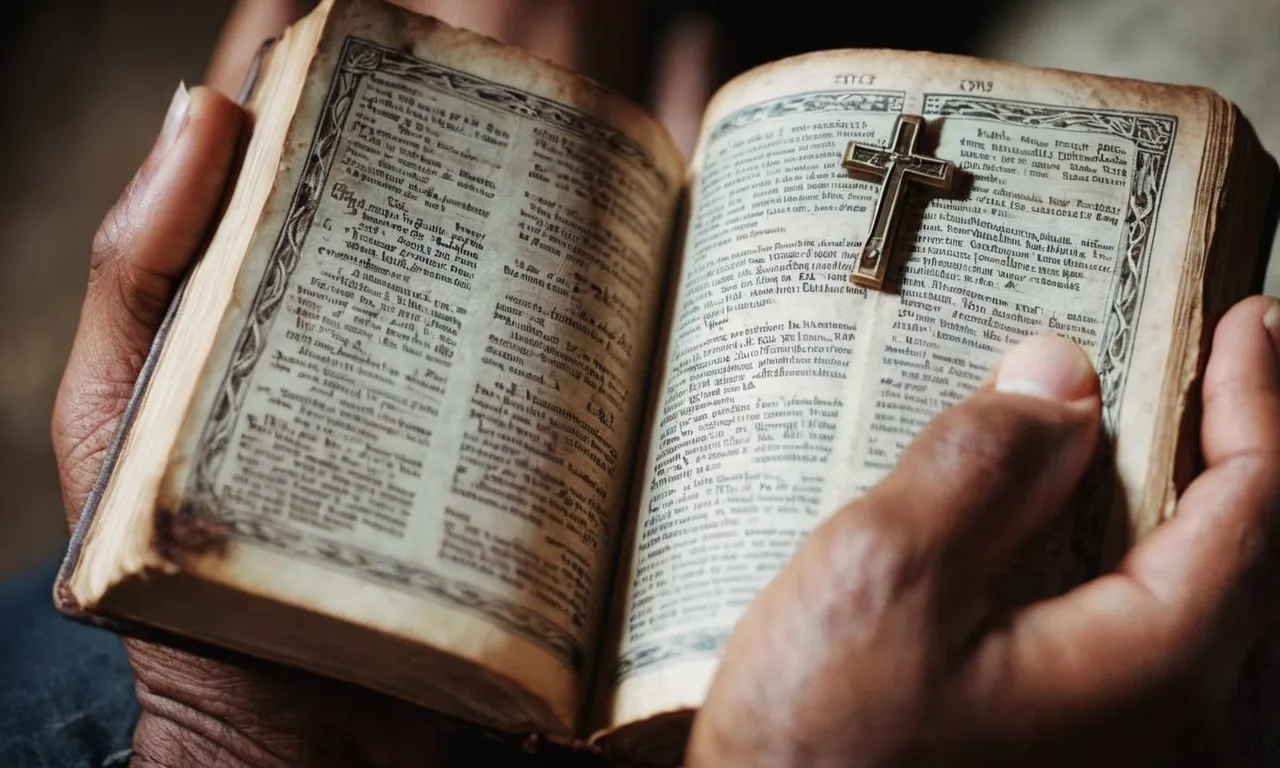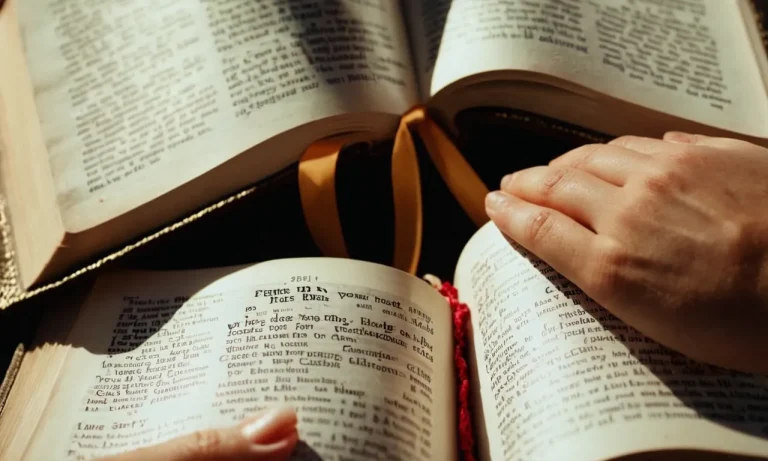What Happened To Lot In The Bible: His Story & Significance
The story of Lot in the Bible is a dramatic one, full of twists and turns that illustrate biblical principles about faith, morality, and God’s justice. If you’re short on time, here’s the quick answer to what happened to Lot:
In this comprehensive article, we will trace Lot’s entire biblical story from his time with Abraham through the destruction of Sodom and its aftermath.
We’ll analyze key events, their spiritual significance, and what lessons Christendom has drawn from them over the centuries regarding righteousness, sin, judgment, redemption, and more.
Lot’s Background & Time with Abraham
Lot’s family background
Lot was the nephew of Abraham. He was born in Ur of the Chaldeans, likely the son of Haran, who was Abraham’s brother. After Haran died, Lot’s grandfather Terah took Lot under his care while living in Ur. When Abraham set out from Ur to go to Canaan, Lot went with him as part of Terah’s family clan.
How Lot connected with Abraham
As Abraham’s nephew, Lot had a close familial connection to Abraham. When Abraham left Ur and moved to Haran and then Canaan, Lot went with him.
The Bible highlights their relationship, referring to Abraham as “Abram” and Lot as “Lot his brother’s son.” (Genesis 14:12).
So Abraham and Lot grew up together and traveled together as part of the same nomadic clan.
Abraham and Lot’s growing wealth and struggles over land
Both Abraham and Lot grew wealthy in livestock, tents, and servants. Their huge flocks led to conflicts over grazing land between their herdsmen.
The Bible notes “the land could not support them dwelling together” because of their abundant possessions (Genesis 13:6).
The situation escalated until Abraham graciously gave Lot the first choice of land. Lot chose the lush Jordan valley near Sodom, leaving Abraham with Canaan.
The amicable separation of Abraham and Lot
Abraham and Lot’s separation was peaceful and mutually chosen. Abraham unselfishly gave Lot first choice of land, wanting to avoid strife.
Lot seized the choice land near Sodom. They parted on good terms, as Abraham even later risked his life to rescue Lot from captivity.
Their separation was necessary due to their large herds and serves as a model of peaceful conflict resolution.
Lot’s Situation in Sodom Before Destruction
Lot’s initial decision to live in Sodom
When Abraham and Lot decided to part ways due to the size of their flocks, Lot chose to settle in the lush and fertile Jordan Valley near the cities of Sodom and Gomorrah (Genesis 13:8-13). At first glance, it likely seemed like an ideal place for Lot’s flocks to graze.
However, unbeknownst to Lot, the residents of Sodom were extremely wicked and sinful against God (Genesis 18:20). Still, Lot decided to pitch his tents close to Sodom, indicating his willingness to associate with its sinful culture and peoples.
The great wickedness of Sodom and Gomorrah
Later on, three angels came to Abraham and told him that the outcry against Sodom and Gomorrah was great, and that their sin was extremely grave (Genesis 18:20). God was prepared to go down and see if the cities were as wicked as the outcry indicated.
When the two angels arrived in Sodom that evening, Lot met them and strongly urged them to stay at his house, because he knew the dangers of spending a night in the city square (Genesis 19:1-3).
The wickedness of the city was highlighted when all the men of Sodom, young and old, surrounded Lot’s house and demanded that he bring out his guests so they could “know” them, referring to homosexual acts (Genesis 19:4-5).
God’s judgment pronounced and Lot’s rescue
At this point, after hearing about Sodom’s demands, the angels revealed to Lot that God had sent them to destroy the cities for their grave sin against Him (Genesis 19:13).
Yet Lot still lingered in the city, hesitant to leave his life behind, until the angels forcibly took him, his wife and daughters by the hand and led them out of the city before God rained burning sulfur on Sodom and Gomorrah, completely destroying them (Genesis 19:15-16, 24-25).
While living in Sodom, Lot was oppressed by the people’s lawless deeds (2 Peter 2:7-8), but he chose material prosperity over righteous living. Thankfully he was rescued before the cities’ judgment.
The Destruction of Sodom and Rescue of Lot
Angelic visitors come to Sodom and meet Lot
The story begins when three angels came to Sodom in the evening and encountered Lot sitting at the city gate (Genesis 19:1).
Lot insisted the angels stay at his house instead of spending the night in the square, not knowing their true identity at that time.
The townsmen’s demand to abuse Lot’s guests
That night, before Lot and his guests retired for bed, the men of Sodom surrounded the house and demanded Lot bring out his visitors so they could “know” them, meaning to sexually abuse them (Genesis 19:4-5).
Lot courageously went outside and tried to appease the mob by offering his two virgin daughters instead, but they refused and threatened to treat Lot worse than his guests if he continued interfering (Genesis 19:6-9).
Lot’s horrible offer of his daughters
Lot’s offer of his own daughters, though shocking by today’s standards, showed his commitment to fulfilling his duty as a host in that culture. According to scholars, Lot likely hoped that if he sacrificed his daughters’ purity, the crowd would be appeased and his angelic guests would be spared.
Still, the mob refused and moved to attack Lot too for daring to judge them (Genesis 19:9).
Angels strike townsmen with blindness and urge Lot to flee
At this critical moment, the angels intervened. They struck the riotous mob with blindness so they couldn’t find the doorway (Genesis 19:11) and urgently told Lot to round up his family members in the city to escape before the coming destruction (Genesis 19:12-13).
Sadly, when Lot shared the warning, his sons-in-law thought he was joking (Genesis 19:14).
So at dawn, the angels had to take Lot, his wife and two daughters by the hand and urgently lead them out of the city before judgment fell (Genesis 19:15-16).
The utter destruction of Sodom and Gomorrah
Once safely outside town, one angel commanded Lot and his family to flee for their lives into the mountains and not look back (Genesis 19:17). Then the Lord rained burning sulfur on Sodom and Gomorrah, destroying them completely along with all vegetation (Genesis 19:24-25).
Tragically, Lot’s wife disobeyed the warning and looked back longingly toward Sodom as she fled. As a result, she was turned into a pillar of salt (Genesis 19:26).
But God did spare and protect Lot and his daughters from the destruction rained down on those extremely wicked cities.

Lot’s Shameful Behavior and Its Aftermath
How Lot lost everything and fled to the mountains
After Abraham and Lot separated and went their own ways, Lot chose to live near the wicked cities of Sodom and Gomorrah.
Despite Lot being a righteous man, he was negatively influenced by the rampant immorality around him and made some incredibly poor choices.
When two angels came to warn Lot of the impending destruction of the cities, the depraved men of Sodom surrounded Lot’s house and demanded he bring the angels out so they could have relations with them.
Lot shamefully offered his own daughters instead, but the angels intervened and struck the men with blindness before ushering Lot’s family out of the city.
As they fled, Lot’s wife disobeyed the command not to look back at the destruction, and she was turned into a pillar of salt.
Left with just his two daughters, Lot escaped to a cave in the mountains, having lost everything he owned and nearly his own life due to his time living in Sodom (Genesis 19:1-29).
Lot’s daughters make him drunk and become pregnant
After the destruction of Sodom and loss of their mother, Lot’s daughters concluded there were no men left to marry and bear children with.
So they hatched a wicked scheme – on two consecutive nights they got their father drunk on wine and had relations with him in order to get pregnant.
Their immoral plan worked, and both daughters conceived children by their own father Lot – one gave birth to Moab, father of the Moabites, and the other had Ben-Ammi, father of the Ammonites (Genesis 19:30-38).
This was a tragic outcome and shameful stain on Lot’s legacy due to the influence of the perverse culture he was surrounded by for so long.
The Moabite and Ammonite nations born from this
The Moabite and Ammonite nations descended from the incestuous relations between Lot and his daughters.
They were idolatrous groups who worshipped false gods like Molek and Chemosh. Throughout Israel’s history they were constant enemies who attacked them and tried to curse them by hiring the prophet Balaam.
God forbid the Israelites from ever seeking peace or prosperity for Moab and Ammon due to their immoral origins and constant hostility (Deuteronomy 23:3-6). The Moabites in particular were a thorn in Israel’s side, oppressing them at various times as retribution from God for their sins and idolatry.
Both nations remained Israel’s enemies up through the time of the later prophets.
Theological Implications & Lessons from Lot’s Story
God’s judgment of sin vs. His mercy toward the righteous
The account of Lot illustrates God’s hatred of sin, seen in His judgment on Sodom and Gomorrah (Gen 19:24-25). Yet it also displays His mercy in sparing Lot and his daughters despite Lot’s poor decisions.
This shows that while God abhors wickedness, He still has compassion on those who follow Him even imperfectly. As Hebrews 4:15 (NIV) notes, Jesus as our High Priest can “sympathize with our weaknesses.”
Examples of righteousness and compromise in extreme situations
Lot is described as “righteous” (2 Peter 2:7) and “distressed by the depraved conduct of the lawless” around him (2 Peter 2:7).
Yet he also chose to live near Sodom (Gen 13:12) and offered his daughters to the violent mob (Gen 19:8) which showed moral compromise.
This reveals the tension believers face in remaining righteous amid pressure to conform. In desperate situations, flawed choices may still be made, reminding us of our need for grace.
The shameful aftermath of sin and its generational impact
After narrowly escaping Sodom’s judgment, Lot’s daughters committed incest with their father through intoxication (Gen 19:30-36), leading to the shamed Moabite and Ammonite lines.
This illustrates how being surrounded by depravity warped their understanding of proper conduct, a tragic aftermath of sin.
It also suggests generational impacts – their offspring faced exclusion from Israel (Deut 23:3-6). Sin has far-reaching implications across generations, underscoring the necessity of guarding our conduct.
Hope of redemption even for those who fall
A bright spot emerges through the Moabitess Ruth, great-grandmother of King David (Ruth 4:13-22), illustrating redemption is possible even for lineages marred by infamous beginnings. Centuries later, Jesus’ genealogy includes sinners and foreigners like Rahab and Ruth (Matt 1:5).
This proves that despite failures, God can powerfully restore those who turn to Him. No matter how badly one falls, there is hope in Christ.
Conclusion
Lot’s story has continued to fascinate and trouble Bible readers over the centuries. While righteous at the start, his compromise nearly cost him everything and led to a shameful end unfitting of Abraham’s once honorable nephew.
Yet his story illustrates key biblical themes of God’s mercy, human struggle with sin, judgment and redemption. It pushes us to ask how we can avoid Lot’s failures in an increasingly wicked culture – holding fast to faith rather than compromise.








